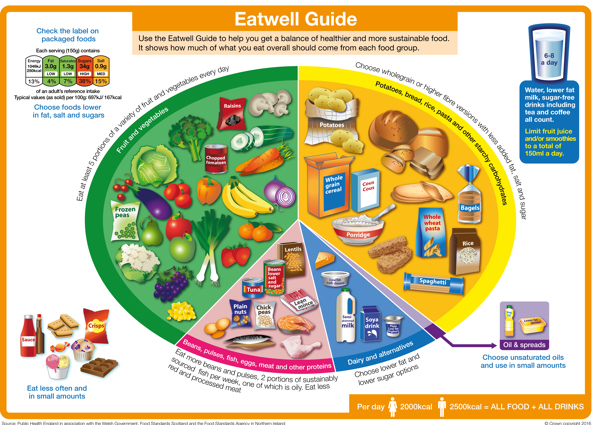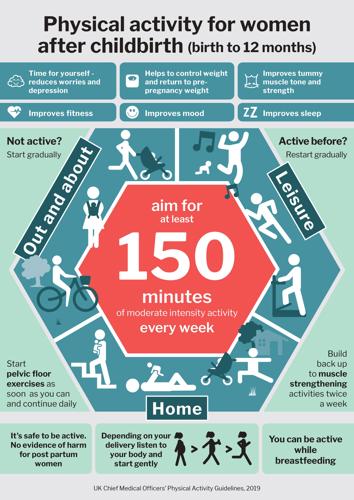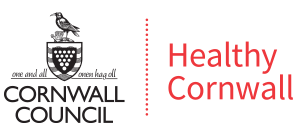Eating Well & Staying Active

Eating healthily while you're pregnant means that your baby eats healthily too. Pregnancy is a good time to think about what you’re eating. What you eat now will help your baby to grow healthily and give them the best start in life and help you to feel your best.
A balanced diet in pregnancy
It’s good to choose a diet based on the Eatwell Guide with plenty of variety! The Eatwell Guide shows how much of what we eat overall should come from each food group to achieve a healthy, balanced diet. You do not need to achieve this balance with every meal, but try to get the balance right over a day or even a week.

Eating Healthily During Pregnancy
This video has been created by The Healthy Pregnancy Team to provide advice on eating a balanced diet during pregnancy
Try starting the day with a healthy breakfast. This should help you snack less between meals – especially on foods that are high in fat and sugar. Here are some nutritious breakfast ideas. For more information on getting a healthy balanced diet:
- Find out more about the Eatwell Guide | NHS
- Vegetarian Eatwell Guide | The Vegetarian Society
- Vegan Eatwell Guide | The Vegan Society
- Having a healthy diet in pregnancy | NHS
- Eating well for a healthy pregnancy: a practical guide | First Steps Nutrition
- Healthy food swaps | NHS
- How to get portion sizes right | The British Heart Foundation
No need to eat for two
People used to say you had to ‘eat for two’ while you are pregnant, but we know now that you only have to eat for you! Your baby will take everything they need from your body and will grow well without you needing any extra calories. In the last three months you may need a little extra, but only 200 calories, that’s the same as a slice of wholemeal toast with chopped banana! It’s good if that little bit extra comes from food high in protein, calcium or iron.
- 10 quick and easy healthy snack ideas | The British Heart Foundation
- 200 calorie snack ideas | Tommys
Weight gain in pregnancy
Weight gain in pregnancy varies greatly and it depends on what you weighed before you became pregnant. Most women put on between 10 – 12.5kg (22 – 28lb) over the whole pregnancy. If you put on too much or too little weight, it can lead to health problems for you or your baby. It is really important that you don’t try to diet during your pregnancy, but you should aim to eat healthily.
- How much weight will I put on during my pregnancy? | NHS
- Pregnancy weight management goal plan | Tommys
Watch our video on how to manage your weight in pregnancy
Foods to avoid in pregnancy
Most foods and drinks are safe to have during pregnancy. But there are some things you should be careful with or avoid as they can cause food poisoning and/or harm your unborn baby.
Avoiding alcohol
Drinking alcohol at any stage during pregnancy can cause harm to your baby and the more you drink, the greater the risk. This is why the low risk drinking guidelines advise pregnant women that the safest approach is to not drink alcohol at all during pregnancy.
- Alcohol and pregnancy | Drink Aware
Reducing caffeine
Caffeine is found in tea and coffee, cola, other soft drinks and chocolate. Drinking a lot of caffeine in pregnancy can cause harm to your baby so the advice is to limit your intake to 200mg a day.
- Calculate your caffeine intake | Tommys
Vitamins and supplements
Eating a healthy, varied diet in pregnancy will help you get most of the vitamins and minerals you need. But it is recommended you take 400 micrograms of folic acid each day in the first 12 weeks and 10 micrograms of vitamin D each day throughout your pregnancy.
Do not take vitamin A supplements or any supplements containing vitamin A (retinol), as too much vitamin A could harm your baby.
Vitamin D explained
Healthy Start
With Healthy Start, you get free vouchers every week to spend on milk, plain fresh and frozen fruit and vegetables, and infant formula milk. You can also get free vitamins.
- Healthy start | NHS
Staying Active

Keeping physically active is great for you and for your baby! Experts advise that, in most cases, physical activity is not only safe but also improves the health of both the baby and the mother. Motherhood is the biggest workout of your life, but you can prepare your body for the challenges of pregnancy labour and birth by staying active and keeping yourself strong and healthy. If you weren’t very active before your pregnancy, don’t worry there are lots of small changes you can make to your lifestyle that can make a big difference to you and your baby’s health.
Benefits to you and the baby
Exercise gives you more energy and makes you feel good. It leaves you feeling less tired and sleep will improve.
It improves and strengthens muscles resulting in fewer aches and pains. You may also have less chance of getting varicose veins and swollen legs.
- It improves your blood sugar control which in turn could help prevent gestational diabetes.
- It will increase stamina which will help you and your baby through labour.
- It will help with your recovery after birth.
- It means you are less likely to gain unnecessary weight during pregnancy and are less likely to hang onto any extra weight after you have had the baby.
- It can reduce levels of anxiety and depression in pregnancy.
- Being active helps reduce constipation, which is a common pregnancy problem.
- The more active and fit you are during pregnancy, the easier it will be for you to adapt to your changing shape and weight gain.
At home workouts
- An easy pregnancy workout | Tommys
- Bumps and Burpees (3 simple workouts)
- Prenatal and postnatal yoga video | NHS
- General fitness, strength and yoga videos | This Mum Moves
- Pregnancy and postnatal exercise videos | Best Beginnings

Pelvic floor exercises
Pelvic floor exercises help to strengthen the muscles of the pelvic floor, which come under great strain in pregnancy and childbirth.
What are pelvic floor exercises? | NHS

